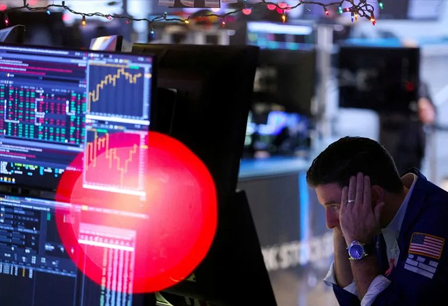U.S. stocks fell on Friday and ended the week lower as investors took in a key report on the state of the labor market's recovery, which underscored still-solid labor market conditions. Friday's losses extended steep declines from the prior session, when concerns over the Federal Reserve's ability to bring down inflation while maintaining solid economic activity resurged.
The S&P 500 dropped by 0.6% Friday to close at 4,123.67. The Nasdaq Composite dropped 1.4%, ending at 12,144.66. The Dow fell by just under 100 points to settle at 32,901.08. A day earlier, the S&P 500 shed 3.6%, while the Nasdaq dropped 5% for its worst day since June 2020. The Dow had lost more than 1,000 points.
The moves Friday morning came in the wake of the Labor Department's April jobs report, which showed a better-than-expected 428,000 non-farm payrolls returned across the U.S. economy last month. Consensus economists were looking for job gains of 380,000, according to Bloomberg consensus data. And the unemployment rate held steady from March to come in at 3.6%, or just slightly above February 2020's multi-decade low of 3.5%.
The report suggested at least the labor portion of the U.S. economy was still on strong footing even as the Federal Reserve began its process of tightening monetary policies. Stocks had swung violently from gains Wednesday to losses on Thursday, as investors appraised the implications of the Federal Reserve's latest telegraphed monetary policy path forward for the U.S. economy and markets.
"The solid 428,000 gain in non-farm payroll employment in April illustrates that the Fed was right to ignore the misleading contraction in first-quarter GDP," Paul Ashworth, chief U.S. economist for Capital Economics, wrote in a note Friday morning.
Investors have had to weigh whether the Fed's monetary policy path forward will succeed in being aggressive enough to address rising prices while still avoiding triggering a deep downturn in the economy. While investors momentarily cheered Fed Chair Jerome Powell's suggestions earlier this week that the central bank was not considering raising rates by a more drastic 75 basis points at a time, they have also had to consider whether more moderate hikes will ultimately be able to bring down inflation currently running at the hottest levels since the 1980s.
"[Wednesday], I think the markets had a sense of relief that maybe Powell took 75 basis points off the table for further rate hikes, suggesting the Fed might take a more mild path," Jeffrey Kleintop, Charles Schwab chief global investment strategist, told Yahoo Finance Live on Thursday. "But [Thursday], I think the market's recognizing that there are risks associated with that — higher inflation, maybe."
"That's certainly what we're seeing here with [Treasury] yields spiking higher. And to me, this is an enduring theme, this isn't just a one-day phenomenon," Kleintop added. "If you look all the way back to August of 2020, there's been one major theme in the markets, and that is short-duration stocks, meaning low price to cash flow, have been outperforming longer-duration stocks, or high price to cash flow ... and that is a trend that's going to continue here."
Treasury yields on the long end of the curve rose further, and the benchmark 10-year yield rose above 3.1%. The continued march higher in Treasury yields and borrowing costs has weighed on growth and technology stocks, which are valued heavily on their future earnings potential.
And the most recent economic data including Friday's jobs report have bolstered the central bank's case that the U.S. economy remains, at least for now, strong enough to absorb some more monetary policy tightening. However, whether that ultimately continues amid even higher interest rates and the myriad of other macro concerns remains to be seen — and that uncertainty has remained a key source of investor consternation.
"The job market is very tight ... there's tons of geopolitical impacts, especially on things like energy and food, which creeps into everything else. Supply chains remain challenged, and we have now Chinese COVID shutdowns which make it even more stressed," Paul Kim, Simplify Asset Management CEO, told Yahoo Finance Live on Thursday. "Bottom line is, there's too much demand for goods and services and not enough supply. And the Fed can't solve those real-world problems, and I think that's what's solving this indigestion."
"I don't think we've hit the bottom yet, simply because we're just starting the hiking process," Kim added. "There's arguably hundreds of basis points to go."












